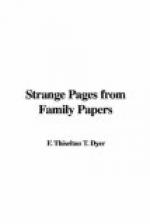the retainers of the Earl of Warren, having learnt
what was going on, captured them and took possession
of the hoard for the earl. A legend of this kind
was long connected with Hulme Hall, formerly a seat
of a branch of the Prestwich family. It seems
that during the civil wars its then owner, Sir Thomas
Prestwich, was very much impoverished by fines and
sequestrations, so that he was forced to sell the
mansion and estate to Sir Oswald Mosley. On more
than one occasion his mother had induced him to advance
large sums of money to Charles I. and his adherents,
under the assurance that she had hidden treasures
which would amply repay him. This hoard was generally
supposed to have been hidden, either in the hall itself,
or in the grounds adjoining, and it was said to be
protected by spells and incantations, known only to
the lady dowager herself. Time passed on, and
the old lady became every day more infirm, and at last
she was struck down with apoplexy before she could
either practise the requisite incantations, or inform
her son where the treasure was secreted. After
her burial, diligent search was made, but to no effect;
and Sir Thomas Prestwich went down to the grave in
comparative poverty. Since that period fortune-tellers
and astrologers have tried their powers to discover
the whereabouts of this hidden hoard, and, although
they have been unsuccessful, it is still believed that
one day their labours will be rewarded, and that the
demons who guard the money will be forced to give
up their charge. Some years ago the hall and
estate were sold to the Duke of Bridgewater, and, the
site having been required for other purposes, the
hall was pulled down, but no money was discovered.
In Ireland, there are few old ruins in and about which
excavations have not been made in the expectation
of discovering hidden wealth, and in some instances
the consequence of this belief has been the destruction
of the building, which has been actually undermined.
About three miles south of Cork, near the village
of Douglas, is a hill called Castle Treasure, where
a “cross of gold” was supposed to be concealed;
and the discovery, some years ago, of a rudely-formed
clay urn and two or three brazen implements attracted
for some time crowds to the spot.
But such stories are not confined to any special locality,
and there is, in most parts of England, a popular
belief that vast treasures are hidden beneath the
old ruins of many houses, and that supernatural obstacles
always prevent their being discovered. Indeed,
Scotland has numerous legends of this kind, some of
which, as Mr. Chambers has pointed out, have been
incorporated into its popular rhymes. Thus, on
a certain farm in the parish of Lesmahagow, from time
immemorial there existed a tradition that underneath
a very large stone was secreted a vast treasure in
the shape of a kettleful, a bootful, and a bull-hide
full “of gold, all of which have been designated
’Katie Neevie’s hoord,’” having
given rise to the following adage:




